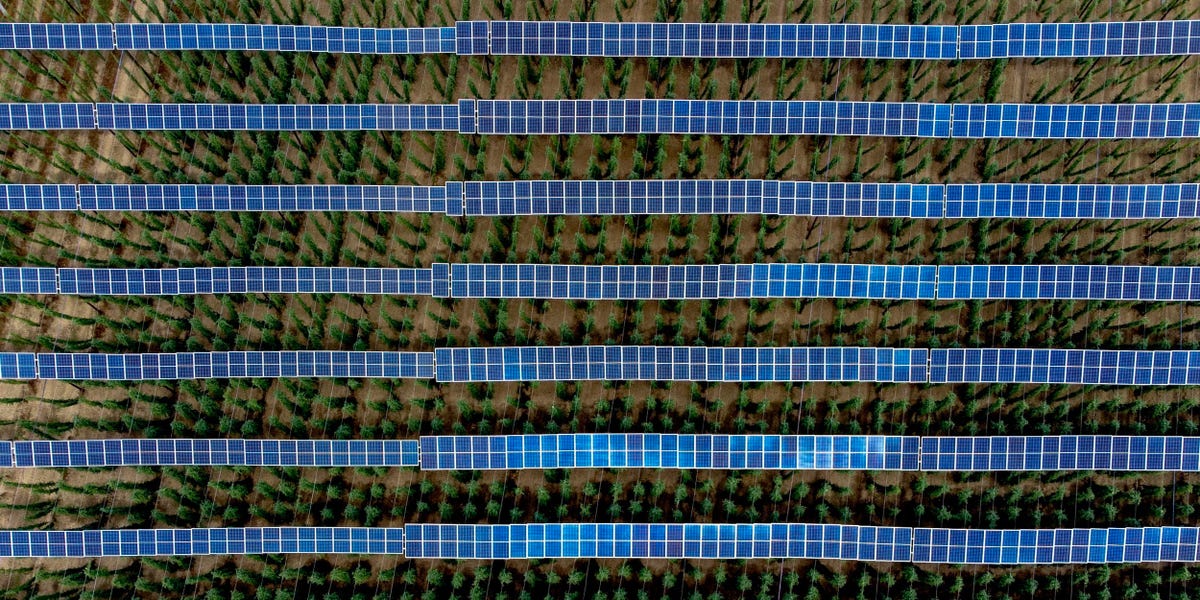Cheap energy being framed as some kind of problem is a great demonstration of why we need a free press that isn’t solely owned by billionaires
They could always just close their coal power plants. Idk why they don’t.
My guess is that in a climate like Germany’s, solar isn’t consistent enough to provide the steady baseline power that coal plants can.
One of the complexities of power infrastructure is that demand must be met instantaneously and exactly. Coal and solar typically occupy different roles in a grid’s power sources. Coal plants are slow to start, but very consistent, so they provide baseline power. Solar is virtually instantaneous, but inconsistent, so it’s better suited to handle the daily fluctuations.
So, in a place like Germany, even in abundance, solar can’t realistically replace coal until we have a good way of storing power to act as a buffer. Of course, nuclear is a fantastic replacement for coal, but we all know how Germany’s politicians feel about it…
We also know building nuclear takes 20 years and costs more than building thrice the capacity in renewables + Germany has no long-term nuclear storage, only temporary one’s a la Simpsons.
You are correct that when you build one new plant every 25 years it takes a long time to spool the industry, the skills, the testing and the manufacturing capability up to build new nuclear.
In countries that regularly build new nuclear it takes 5 years, comparable to any other power source. When France when through their mass-conversion to nuclear in the 70s (following the oil crisis), they put 2-3 new nuclear plants into operation every year.
All new western nuclear is in “production hell”. We don’t build them often enough to retain the skill set or for industry to dare invest. So they become massive state-run enterprises.
If we were serious on solving our climate crisis we would build nuclear power plans en masse.
Germany had 17 active nuclear plants in 2011 and decommissioned them all by 2023.
They were already past their expiry date. Germany would face the same shit France is facing with their old reactors.
deleted by creator
I guess I meant not all of them and especially not at the same time but that wasn’t clear in my first post. I understand that a baseline is needed but if during daytime they’re generating excess constantly then shutting down a few wouldn’t hurt. Especially since Germany is one of the biggest offenders in the world when it comes to coal. Storage is definitely a concern but in case of surges there’s other power from neighboring countries that can help with the demand. Sodium ion batteries are looking like a good possibility.
Coulnd’t we use solar to pump water into reservoirs, and then let the water flow through hydroelectrical dams when we need the electricity?
[yes](> https://en.wikipedia.org/wiki/Pumped-storage_hydroelectricity)
Taking into account conversion losses and evaporation losses from the exposed water surface, energy recovery of 70–80% or more can be achieved. This technique is currently the most cost-effective means of storing large amounts of electrical energy, but capital costs and the necessity of appropriate geography are critical decision factors in selecting pumped-storage plant sites.
Oh wow, I had no idea this existed. Awesome!
Wait Are these not common where you are?
We have a lot of dams, but I haven’t heard that we were pumping water into the reservoirs.
We also don’t have, like, fields of solar panels, as far as I know. I think it’s too cloudy here. But we have wind turbines, especially in coastal areas.
because solar panels are not a controllable energy source, solar is great until there’s a cloud or it’s nighttime, coal on the other hand is a controllable energy source. Since we can’t effectively store energy we have to be constantly producing enough for the whole population, it’s a really hard job!
Because they would have brownouts overnight and when the weather was bad.
Obviously…
Germany it’s more the Russian gas they get. Shit hit the fan for them when they invaded Ukraine. Germany was like fuuuuuuuu
Because as the article says, consumers use more power during non-solar hours.
The Ukraine war has also caused oil and gas prices to rise in Europe, so all alternatives to those need to remain on the table until Russia fucks off.
Not enough preparation for saving energy overnight.
Well it is a problem, sort of. It’s a failing of the market.
But it does open up another market for energy storage so it will save itself through regular marker forces.
But we absolutely want energy suppliers to make money off solar (over a year) or they will simply stop building more of it. I’m not sure if the German state is losing money on this though, in which case they absolutely need to build more storage.
I’m getting really worried about how energy is going to be generated in winter once solar and batteries completely dominate energy production in the summer.
But it does open up another market for energy storage so it will save itself through regular marker forces.
This is the market working properly.
Well yes.
But having to pay people to take a good/service from you is really/ really weird. Not really sure how to describe it.
Happens all the time. My employer pays a company to come collect our e-waste, which they then sell to a recycler who strips it and sells the recycled metals. One company’s trash is often another one’s treasure. Or better yet, one company’s liability is another company’s asset. Excess electricity is a liability to the electric company so they pay to get rid of it. The amount they’re paying for disposal is less than the potential cost of keeping the liability around (equipment failure in this case).
The thing is that it does represent some problems. First of all if Germany has already reached the limit of what it can do with solar then that’s sobering news because it is far from 100% sustainable. More solar than it can use? We should ask why. Not enough storage capacity: that’s a problem when consumers use more power in solar off-hours. And if energy prices become too volatile or even negative, that could harm the non-solar energy provider who provide the backup that solar requires.
I get the anti-corporatist message and all, but really we should look a little more deeply than our favorite narrative if we want to understand things. Reddit also needs to realize that business pages cater to business interests and investors, so not every headline is framed in terms of consumer benefit. News outlets can publish articles for business readers whether or not they are owned and puppeted by them.
Reddit?
it an old site like, kinda like Digg. all the brains left about a year or so ago when they made some horrible business choices and then IPO’d. a lot of the users came here to lemmy.
Not to be too much of a contrarian, but it sorta is a problem if it is too cheap to support the people that are required to repair it and the parts/replacements for stuff that has failed. Plus, in 20-30 years you are going to have to have enough money on hand to replace todays panels, which if energy costs are almost free/negative, you might not. These are somewhat solvable problems (make energy costs just a tax to support the grid and cut out profit from the equation for the public good), but it is a bit of an issue that probably needs to be planned for.
Then it’s not “too cheap”. Charge the price it takes to maintain the production.
The problem isn’t that the energy is too cheap, it’s that there’s too much of it, which is why it’s so cheap. An electrical grid can only support so much power and there is no cost effective way to store enough energy to run the grid for any appreciable amount of time, so it all must be used or else the system becomes unstable.
That’s so. At the same time I’m seeing heaps of stories about me ways to cheaply store power with cheap and common materials lately, so it seems like more of an engineering and infrastructure problem
I can hear Nikola Tesla rolling over in his grave
Hook those coffins up to generators for infinite free electricity.
Make it output only DC and watch it churn!
Can we use him to generate power?
No. That’s like saying the UK has too much wind power because our prices occasionally go negative. What Germany might not have enough of is battery and other storage
Did you know that the best way we currently have to store energy are dams? In most dams you can install a pump to take water and store it higher, then when energy is needed you simply open the turbine.
The problem with dams or pumped storage is it only works in specific places where you have a higher place to put lots of water.
Yep! I suppose we could build a huge Tank or something XD
I would be all for that, but I think a lot of smaller tanks of compressed air might be better or easier.
A dam would be a huge natural tank. I can’t think of a similar structure that is safe enough to prevent widespread destruction.
Decommissioned mines can be used as gravity batteries.
Seems like dams should only be used in those situations then…
You need a certain kind of landscape for that. I think the UK only has a couple of pumped storage power stations due to lack of suitable sites
Hydrogen and Methane Power-to-gas can store more power for longer than hydro pump
I’m not sure why you’re getting downvoted, but companies are looking to use hydrogen fuel cells for 18 wheelers for just this reason. They won’t have to stop for gas even on long trips because the energy density is very high and the weight is less.
Here are a few charts about it from the DOE: https://www.energy.gov/eere/fuelcells/articles/fuel-cell-and-battery-electric-vehicles-compared
The downvotes are because almost all of the global hydrogen production is made either with natural gas, as a byproduct of oil drilling or through coal.
In its current state, it is a fake green product pushed by the oil industry to hamper the transition.
Ah - that makes sense, thank you. You’re correct, but I work in the aerospace industry with hydrogen fuel cells and green hydrogen is all I’m familiar with, but I realize now that this was bias on my part.
Is hydrolysis not cost-effective? If we have excess electricity, as in this case, can we not use that to get hydrogen?
On the recent lemmy topic of using up votes and down votes incorrectly.
Literally just stating a verifiable fact, not in support or against the technology, and I get down voted lol.
huh i hadn’t heard of this one? I went to a dam last year and that’s what the guide told us…
I think it’s the physical size of the reservoir that is the limiting factor. You can’t reasonable expand most reservoirs, but it’s relatively easy to create new hydrogen/methane storage tanks.
Yes but pumped storage is about 80% round trip efficiency vs power to x which is barely touching 20% out of the lab. And power to X needs an epic fuckton of very clean water, which also isn’t easy to find.
Seems like a great profit opposite grid storage!
Fuck that title. No such thing as too many solar panels. The only thing that is bad is how the energy is used or if it’s wasted. Free energy should mean algae production which would mean carbon negativity. Negative energy price should mean negative carbon emissions, get on it.
You are right, this is BS.
I recently researched this and Germany’s grid is quite “smart” (the oldest technologies involved, such as DECABIT or VERSACOM over PLC, very much predate the term “smart grid” but whatever) and power plants and households are connected for production and load control. Power plants are required to participate but households can use a load management system for water tank heating (the basic premise is that specific frequency impulses are sent over the power grid for primitive (originally relay-based!) logic in DECABIT meters to switch depending on the assigned device group, and meters count in lower-price mode while the load is activated for a guaranteed number of hours each day; you can manually override the switch for expensive on-demand water heating) and/or HVAC (here, a smart thermostat is usually used that gets real-time energy prices and decides based on its temperature range settings if it saves money to run heating/cooling).
People in Texas apparently hate this (muh freedom), and look how reliable their grid is!
Anyway, solar, unlike coal or nuclear, is absolutely capable of going off-grid if necessary. There is an MPPT system in their inverters that usually works to operate the panels at the optimal voltage & current so that it can suck the most power out of them but it can be overridden to work at below 100% efficiency, or even 0%. This will cause the panels to run with no current draw and get about 20% hotter but they are designed to withstand this. Similarly, wind turbines can be braked, water can be passed outside turbine shafts and so can pressurized steam if you really need to cut production quickly. Still, this is an emergency condition, it is preferred to use pumped hydro (responds in 1 minute, limited capacity) or batteries (respond in seconds, very limited capacity) or lower coal/gas-based production (responds in 3-20 minutes for as long as you wish) or load-side management to regulate the grid, as it wastes no power.
The system is very complex and robust, the frequency (the variable most dependent on production/load balance) only dips below 49.8 Hz about once per a few years (the emergency value that was reached in February 2021 in Texas and can only be sustained for minutes before total blackout is -1% from nominal (49.5 or 59.4, respectively) and has never been touched in Europe’s modern history).
(You’d think it would be voltage what falls in case of too little power but it can be readjusted quite easily with switched transformer taps and, oddly enough, reactive power management (connecting a few capacitor/inductor banks to mains) when necessary, however frequency control is the difficult part.)Could you elaborate how to grow algae with electricity?
Turn excess electricity back into heat and light.
Input heat, light, water, air, and nutrients.
Output oxygen and carbon (algae biomass).
Free energy should mean algae production
This is a jump I’m not understanding. Do you mean that energy having no cost would mean that the electricity generated can be used to make algae? Or that it’s a byproduct of?
Do you mean that energy having no cost would mean that the electricity generated can be used to make algae?
Yes. Make algae with energy that produces no carbon dioxide = carbon sink.
There’s just no economic incentive to do so. (yet?)
The economic advantage is that our grandchildren might be able to have an economy if we don’t crash and burn this place before we die.
I agree. Unfortunately that is too abstract a factor for most peoples present investment decisions.
Exactly! Put a real price of carbon and this will start to chance.
Germany actually spends money to stop Denmark producing power on windy days when prices get too low. Instead we could be making hydrogen and storing it in so many creative ways
Its ‘free’ anyway so there should be no concern about how much of it is lost in conversion
Maybe we’ll get to the point. This news just shows us, that solar power can really be very impactful, even in not-so-sunny Germany. And that we’ve reached a turning point, where we can no longer ‘just’ put up more solar panels, but also start developping systems to store this excess energy in an economically feasible manner.
But actually, that’s nothing very new either. At least for home owners, who just put solar panels on their roofs, also investing in battery storage to use most of the produced energy themselves has been the economic strategy for a few years, since the price gap between what you got for putting energy into the grid, and what you had to pay for taking energy out of the grid was the only thing left that (economically) incentivized people to install solar power ever since the so called “Einspeisevergütung” subsidies have been dropped.
Nothing is free. Equipment costs money and time to build, operate, maintain, and repair.
The equipment to harvest energy, is built already and is practically being held inactive, because companies can’t make money off it. If we could invest in ways to convert even some part of that excess energy into energy that could be sold later, I can’t see why this should not be feasible.
The way I see it, companies are interested in making money on energy and not supplying affordable energy
The grid needs the supply and demand to be balanced for the power to be stable. Otherwise you get fluctuations in voltage and frequency which are both bad for anything connected to the grid.
There can absolutely be an oversupply of energy. We need to either find ways to store that surplus energy, or use it for something positive like desalination or carbon capture.
There’s been more solar and battery storage capacity installed this year+last year in USA than all prior years combined. And those investments are happening because the return of investment is huge. Those batteries are there to smooth out the supply and helps keep the grid stable.
Oh no, it’s too bad Germany isn’t surrounded by other countries it could sell that excess power to!
Germany has lots of grid connections to other countries, and are pretty surely selling off what they can get rid of, but France has nuclear, Sweden and Norway have hydro, Denmark has wind and solar. All these markets are also currently negative. We’ve had negative prices for almost 14 days now, but somehow they went into plus today here in Denmark, although we (personally) had lots of sun and could sell 61,9 kWh from our solar panels.
I just checked, and the prices are near identical between: Germany, Belgium, Poland, Austria, France, Denmark, Norway, Sweden, Estonia, Latvia and Lithuania.
Oh no, it’s too bad Germany isn’t surrounded by other countries it could sell that excess power to!Your sarcasm is misplaced.
Wait. You know they were being sarcastic right?
I thought you really just wanted to show your knowledge until that last part.
Of course it was sarcastic, which is exactly why it doesn’t make any sense. The sarcasm is what’s idiotic about the comment I replied to. Because it indicates that Germany isn’t using obvious options. Of course they are using those options, as are all other European countries.
Edit:
I’ve changed the last part of my comment above to show that I responded to the original comment understanding it as sarcasm.
Gee, you mean some internet rando didn’t figure out a solution that no one in German energy could think of?
I think he was suggesting that it’s not actually a problem and this whole article was penned by someone with an agenda to paint renewables as bad.
Which is a totally reasonable assumption honestly.
I don’t know how EU grids interoperate so this could be irrelevant:
There is a fear, with this sort of thing, of falling into the innovators curse. By moving first/fastest (especially when it comes to infrastructure) you make all the mistakes, have the oldest equipment, and the most technical debt. Now if Germany is able to make a market (that didn’t previously exist) out of this excess daytime generation they could get undercut by a neighbor who learned from all of Germany’s mistakes and who bought newer, more efficient panels. Which would effectively take Germany’s costs associated with making the new market and set the money on fire.
Basically the fear of capitalism can be as detrimental as the capitalism.
It probably wouldn’t be negative prices if they could. I’m guessing it can’t be sold easily due to distance or some other factors? Which is why it maybe has to be used. But I’m just guessing.
The whole European grid is connected (which is a miraculous feat). And yes, there is a European market for energy where countries can sell surplus and buy in high demand situations.
The US is split into three power grids: Eastern interconnected, Western interconnected, and Texan (because Texas’ strident Independence forbid them from connecting to other states, even though their power grid has failed spectacularly in recent years). (I bring up these three delineations to show that energy can be transferred over pretty large distances.)
As we know, the US is a geographically large country. But technically, power can be transferred from the middle of Utah, across Nevada, and into California. So power transmission distances can be pretty large.
There is energy loss for sure, so it’s not always especially efficient. But if Germany is generating so much solar power that it’s impacting their market costs, that shouldn’t be a massive hurdle. In essence, they should be able to sell electricity to Poland or Austria or other neighboring countries.
Maybe there are other reasons that restrict Germany from selling their surplus power. But I don’t think distance is it.
The thing is, it is not a German-only topic. There is the same discussion ongoing in Austria. There is a lot of solar already in place. That is really great! Now we need good storage solutions as a next step
Interesting. Yes, this is a good problem to have.
It gets even more absurd. The southern states blocked building large power lines to transport cheap wind energy south. Now they struggle because the chea renewable energy cannot go there. So while there is plenty of renewables in the north the south still runs coal plants to provide local energy. But then the people in the north have to pay for “network fees” because the South couldnt take their energy.
Because of this it was suggested to split the German energy market in two, where the south which fought against renewables would have to pay the actual electricity costs instead of leeching of the North that properly build up renewables. This was fought teeth and nails because the South of Germany is like Texas but with an even worse superiority complex.
Physicists are warry about splitting atoms; historians are warry about splitting Germany.
Idk, we could have saved millions of people if we had done this in 1918
It’s okay, this time it’s a horizontal split, not a vertical one. That makes it okay and completely different.
Yeah there are already a few splits. The Aldi equator, the Weißwurstäquator.
“South Germany” Du meinst Bayern, oder ist Hessen auch dabei? xD
Hauptsächlich Bayern, aber Hessen und BaWü haben sich mWn. bei Netzausbau und Ausbau erneuerbarer Energien bisher auch nicht mit Ruhm beckleckert.
Aktuell wird doch ne Stromtrasse durch BW gebaut. Diese lächerliche Nummer von wegen, wir hätten gerne Strom, aber keine Trasse, war eine astreine CSU Nummer.
Nice. Now work on storage solutions to cover nights.
It’s pretty funny. The article says that this is where money is being spent next (it implies it’s government funded), but the author acts like that’s a bad thing.
Unless new installations are spurred on by subsidies or power purchase agreements, oppressed profitability could eventually halt Germany’s solar expansion, Schieldrop said.
Instead, focus is likely to move onto improvements that will make more use of the energy produced, such as investments in batteries and grid infrastructure.
It’s wild. This guy is suggesting that they subsidize solar installation, in the exact same article where he’s saying there’s too much solar. Either the article is disingenuous or he’s an absolute idiot.
“oppressed profitability” is a fucking brutal turn of phrase.
They’re not mutually exclusive.
Solar production is quite variable. This time of year there is often excess production, but in fall or winter there can still be shortages. So it may still be worth subsidizing more production, though there might be a debate as to how much subsidy should go to storage vs extra solar production. Another possibility is to come up with non-capital intensive ways to turn cheap electricity into something useful but I’m not totally sure what that would be.
Either the article is disingenuous or he’s an absolute idiot.
Or maybe you didn’t realize this was an analysis of the situation and an outlook on possible future development based on his economic expertise rather than a call to action.
No, it’s not wild or pretty funny. The author says that if energy prices are negative then there’s no incentive to build up more generation capacity and more incentive for storage capacity. If the government still wants more generation capacity then it has to provide incentives i.e. subsidies.
Wow, two of them.
I mean… Good? Shouldn’t that be the goal, electricity at no cost to the people?
It costs something to build and maintain the infrastructure to distribute power. Typically that cost is recovered through payments for the generation of the power, which becomes a problem if generation costs get too low. It suggests that we should probably consider a different model of paying for that infrastructure now that the reality of generation has changed.
Won’t someone think of the poor capitalists who can’t love better lives then those around them!
/s, just in case.
Well in a very basic way, more solar than we can use means there is waste. Too many panels produced and installed. And if solar generation capacity is going to waste, that means Germany doesn’t have enough storage to keep it in, and that’s a problem. And who knows what negative energy prices will do to the other power producers who back up solar (which, you know, doesn’t produce at night). That would be a problem. So there is a little more to this than just the headline. Also, Reddit needs to learn that business stories are written for investors and business readers and they don’t frame everything in terms of broad human interest.
No such thing as too many solar panels, only not enough storage.
There’s no upper limit on either really. But why would you ever install more than you can store? That’s still waste. Solar panels have nonzero cost and environmental impact.
Leave it to the business world to wet-blanket this because of money. Really helps the cause, public opinion, and such.
Too much clean energy that is nearly free sounds like a much better type of problem to solve than most.
sounds like a good problem to have
Imagine if we had this for housing. Sometimes it feels like we’re close to post-scarcity if we just wanted to.
The US has enough resources that scarcity is already mostly a prioritization problem rather than a supply problem, but for whatever reason we’ve decided we’d rather have billionaires.
This is a clear social good.
If it threatens economic hardship on solar power producers then it’d be extremely rational for the government to subsidize those companies.
It’s just a question of shifting load. As electric cars become more common you could program the residential and parking chargers to only charge when electricity is free and stuff like that.
If the problem is that energy is too cheap, then the power grid should be entirely nationalized. We don’t need to prop up their profits.
I’m all for nationalization[1] but Germany hasn’t indicated that’s a direction they’d like to go in - it’d be absolutely terrible if this clear good ended up collapsing the green energy market and forcing a nove back to fossil fuels though.
- Actually, specifically in Germany’s case, I’m not in favor of nationalization since something is seriously fucked up w.r.t. their energy policy. I don’t trust the people who just shuttered all the nuclear reactors.
Scarcity is a requirement for capitalism.
Oh for Darwin sake! This is a distribution problem, and relates to optimising efficiency.
Solar powered citizens: “Fuck you, pay me.”
Oh no! Failing from success! /s
Free energy!






















